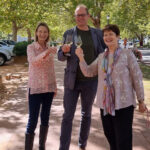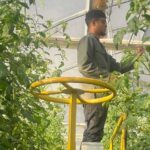
There’s more to Africa’s food system paradox than just agricultural issues, says UN advisor
Article by Engela Duvenhage. Photo taken by Henk Oets
There’s more to Africa’s food system paradox than just agricultural issues, says UN advisor on Africa
Africa can finance its own development and it is already doing it. Unfortunately, too many policymakers in Africa have a mindset of managing poverty, rather than of managing development. Its food system paradox isn’t grounded in a lack of agricultural resources, but in the geopolitical, financing and energy issues plaguing the continent. This was the stern message from Ms Cristina Duarte, United Nations Special Advisor on Africa, and Under-Secretary-General of the Office of the Special Adviser on Africa (OSAA), who was guest speaker at the recent African Food Dialogue in Stellenbosch.
The event was hosted by the Southern African Food Lab and the Faculty of AgriSciences at Stellenbosch University (SU).
Before joining the UN, Ms Duarte served as Minister of Finance and Planning of the African island nation of Cape Verde, as vice president of Citibank, and as a former director of a World Bank reform program.
During her three-day visit to SU, Ms Duarte through various sessions interacted with academics and students from SU, as well as from the University of the Western Cape and the University of the Free State.
In welcoming Ms Duarte as speaker to the African Food Dialogue series, SU vice-chancellor Prof Wim de Villiers described her talk as a fitting end to Africa Month celebrations at the University. He underlined the importance of the series as a vehicle to bring together diverse, influential stakeholders in the Southern Africa food systems to respond to systemic issues in creative ways and to inspire change in the thinking and tackling of complex social challenges.
Ms Duarte was very vocal in describing Africa’s food systems paradox as a chronic one that existed long before the COVID-19 pandemic impacted it even further. She said it existed despite the resource-rich continent being home to up to 60% of the world’s uncultivated arable land.
Africa has not delivered the Millenium Development Goals (MDGs) by 2015 and she doesn’t foresee Africa by 2030 reaching the UN’s Sustainable Development Goals (SDGs) which were set out as shared blueprints to ensure peace and prosperity for people and the planet.
“In fact, we have gone back since these were adopted 7 years ago. The gap is huge, not to say cosmic,” she noted. “Even if our economies grow by 7%, which it isn’t, there will still be more than 400 million people living in poverty by 2030.”
Ms Duarte added weight to her statements by highlighting the following:
- In 2021, 270 million people in Africa were undernourished – a 42% increase from 2000.
- Around 60% of Africa’s people suffer from moderate or severe food insecurity – double that of the world average of 30%.
- Severe food insecurity has risen from 2014 from 16% to 25% today.
- Smallholder farmers ensured the production of 80% to 90% of all foodstuffs.
- 70% of all people in Africa in some way derive their income from agriculture.
- Africa spends approximately 100 billion dollars on food imports, yet only exports around 50 billion dollars’ worth of foodstuffs.
- The world’s population is expected to increase by a further 2,4 billion people by 2050.
- To feed this growing population overall food production must grow by over 70% by 2050.
The lack of available arable land is a strained resource worldwide. Therefore, any increase in food output is becoming increasingly reliant on optimized farming practices and ways to maximize the value that can be extracted from existing farmland.
“The system already understood something very simple: that Africa must be part of the solution to be able to feed the additional 2,4 billion people. There is no way that this can be done without bringing Africa into the equation, because we have the resources, such as land, water, sun, markets, young working force.
“Unfortunately, we are selling thousands and thousands of hectares of land in Africa. We are losing our young workforce. The growth of Africa’s middle class does not strengthen Africa’s own production. The greater import volumes needed to feed the growing middle class are only benefiting the production and economic growth of other regions.”
To ensure a better future, African nations must build highly productive, labour-intensive economies that can generate 18 million jobs annually.
“The agricultural sector is best placed to deliver on this,” Ms Duarte said.
She added that given geopolitical influences, the agricultural sector will still grow whether Africa decides to play an active role or not.
“The question is not that it will happen, but how it will happen. In fact, it is already happening – again. And we can decide if it will happen in ‘their’ way, or in ‘our’ way,” Ms Duarte challenged. “We need better leadership and more ownership, to better control the huge deficit between our own economies and financial flows.”
She believed it would be “impossible” to unlock Africa’s food systems without adequate energy provision, infrastructure and higher energy usage.
“The continent currently only uses 3% of the world’s electricity supply. To put it into context: in 2019 the European Union consumed over three times as much energy as Africa, and Germany and France’s combined consumption was more than that of the whole of Africa’s.”
Despite possibly being the only segment of the economy that can deliver on SDG promises, the agrofoods sector is unfortunately not seen as such by African partners and African policy makers. Too many economic policies with conflicting objectives are at play.
Ms Duarte said that most UN reports over the past 10 years have typified Africa as suffering from low yields, small markets, low levels of investment, and lack of access to markets, financing or quality goods.
She said the narrow approach of traditional economic policies, which was captured by neo-liberal thinking since the 1960s, dominated essentially by a monetary approach does not provide all the tools to understand Africa’s many paradoxes.
“We need to understand how the geopolitical economy focusing on the relationship between the state, society, individuals, and markets impacts the food system paradoxes at large. A better understanding of the financing paradox will improve understanding of the food system paradox.”
She underlined how Africa is already financing its own development, but how this is not the perception of its leaders across the continent.
“We are not financed by third entities. We can do it ourselves,” she noted.
Only 65% of national budgets are financed with taxes. According to 2021 data from the African Union Commission and Organisation for Economic Co-operation and Development (OECD) on Africa’s development dynamics, three-quarters of the continent’s funding is driven by domestic resources. Private savings contributes 38%, and public revenue (excluding grants) a further 43%.
External flows play an important role but a complementary one:
- 4% through international development enterprises (IDE)
- 3% through portfolio investment
- 7% from remittance
- and 5% through official development assistance (ODA)
A major drawback within this potentially positive scenario is that Africa annually loses $70 billion to inefficient public spending and $46 billion to revenue forgone due to inefficient tax exemption systems. Between 1970 and 2018 illicit financial flows (IFFs) cost Africa $2 trillion. IFFs and debt levels are ever increasing.
She therefore described Africa as “a net exporter of capital to the world” of around $300 billion annually.
Despite Africa potentially having the necessary financial resources, its leaders are begging for debt relief and debt suspension and “have a mindset of managing poverty rather than development”.
“You don’t use the same policy framework for both,” she noted.
According to Ms Duarte, strong systems and institutions are “the missing pieces of the equation”. Internally driven financing within the next ten years is needed to strongly mobilize domestic resources, or else it will be too late to deliver on sustainable financing or sustainable development goals.
She explained how stronger domestic resource mobilization could strengthen countries’ geo-political positions and allow them to enjoy higher decision-making levels on how to finance their public deficit. It will in turn allow countries to redesign and shape their own risk profiles, to tap into international markets and capital markets, and be in an overall much stronger position. The challenge is to build robust domestic resource mobilization systems to increase Africa’s policy space, which, by its turn, is a prerequisite to improve Africa’s economic and financial spaces.
“By building domestic resource mobilization systems you can put your own country in a trajectory of predictable cash flows, which is an aspect that credit rating agencies look for,” Ms Duarte noted.
However, insufficient infrastructure, a weak public finance management value chain and a deficit in state intervention hamper Africa’s food systems.
“It is impossible to unlock food systems in Africa without electricity or water,” she noted in her closing remarks. “We need a conducive environment to unlock it.”



